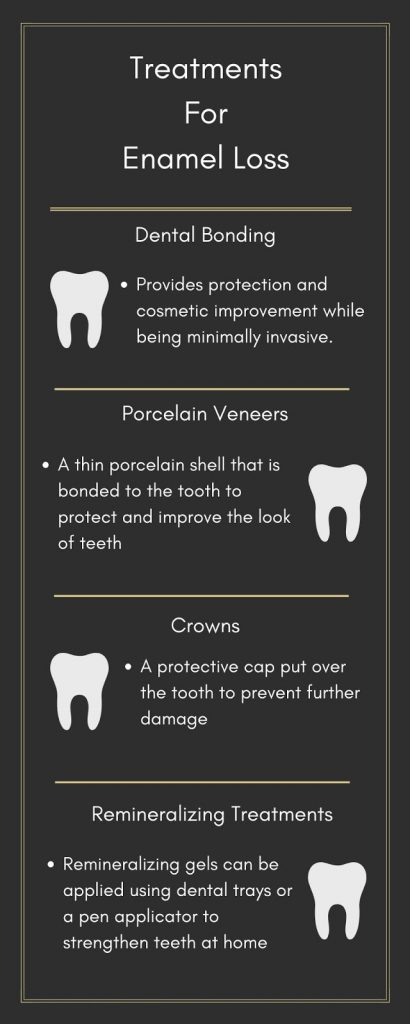Even though tooth enamel is the hardest substance in the body, it can demineralize over time. Demineralization weakens the enamel and can lead to cavities, chips in the teeth, and tooth sensitivity. Once tooth enamel has worn away, it will not grow back, leading to more pain and cavities. The best way to deal with this is to try hard to prevent it in the first place. To strengthen your teeth, follow these simple steps:

1. Mind Your Diet
The bacteria that cause cavities feed off of the sugar and starch we eat and, in turn, produces enamel-eroding acid. The acid present in soda (both diet and regular), citrus fruits, pickles, and tomatoes also weaken the enamel.
Try limiting your sugar intake to no more than 13 grams per day. According to an article published in BMC Public Health, limiting your sugar intake will significantly reduce your risk of oral health problems. Refined carbohydrates like bread, pasta, chips, and crackers convert to sugar in your mouth, so it is best to limit or avoid them.
2. Snack Less Often
When your teeth are exposed to sugar and acid constantly, bacteria have a better opportunity to grow. If you cannot significantly limit your sugar and refined carbohydrate intake (which is difficult to do), you should at least limit how often you snack.
3. Use a Straw for Acidic Drinks
Highly acidic drinks include:
- Soda
- Lemonade
- Orange juice
- Coffee
Drink these beverages through a straw to limit the amount of acid your enamel is exposed to. You should also avoid sipping an acidic drink (like coffee) slowly throughout the day. Instead, drink your beverage with your meal and rinse your mouth with water once you are finished.
4. End Your Meals With Cheese
According to research, the casein and whey protein in many types of cheese can help to reduce enamel demineralization. Chewing on cheese will also stimulate saliva flow, which helps to wash away acid and bacteria. If you’ve packed some string cheese in your lunch today, be sure to eat that last.
5. Use the Right Toothbrush and Toothpaste
A rough toothbrush can damage your enamel. Be sure to use a soft-bristled toothbrush and be mindful about how much pressure you are applying while brushing. Brush in small, circular motions rather than back and forth. Check your toothpaste for the ingredient glycerin, which can cause a film to form over the teeth that block the minerals in your saliva from strengthening your enamel.
6. Use Remineralizing Treatments
Calcium phosphate and fluoride, the ingredients in remineralizing gels, have been scientifically proven to strengthen tooth enamel. Remineralizing gels often come in the form of a pen applicator or in teeth whitening trays that you can apply to your teeth at home.
7. Chew Sugar-Free Gum
Chewing sugar-free gum can help to stimulate saliva production, which washes away bacteria and the acid it creates. However, gum that contains sugar will completely cancel out this effect. Look for sugar-free gum with xylitol, a natural sweetener, listed as one of the first ingredients.
How to Treat Enamel Loss
Once your tooth enamel begins to erode, you may start feeling sensitivity when you eat sweets or foods that are too hot or too cold. You may also start to notice cracks or chips in your teeth. If the erosion is very advanced, you will notice indentations on your teeth (“cupping”).
But what can you do once your enamel has already begun to erode? Because it is not made up of living cells, it cannot repair itself. If the erosion is not too severe, dental bonding can be done to protect the teeth. In more advanced cases, treatments such as porcelain veneers or crowns can be applied to cover the teeth, protecting them and reducing sensitivity as well as making them look healthier.
If you have any concerns about your oral health or are interested in a cosmetic dental procedure, please schedule a consultation by calling (310) 273-0111.
